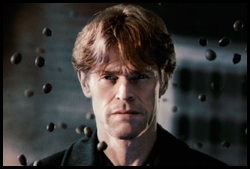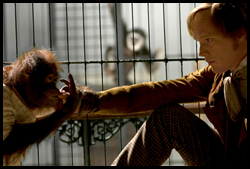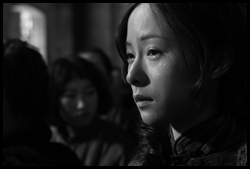 |

|
The Imaginarium of Doctor
Parnasus |
Terry Gilliam is
cursed. Ok, I'm certainly not the first to think this (Googling should
find thousands of hits on this topic), but it's clear that he's one of those
tortured souls who seems to have to struggle constantly for his art. From acts
of God to the machinations of studio hacks and unscrupulous producers, he's had
to bite and claw for almost every film he's ever made. And now, alas,
he's had an actor die while filming a movie. The circumstances of Heath
Ledger's death and subsequent Oscar win are well told, to be sure. And,
inevitably, it's Heath's contribution to this film that will be discussed and
scrutinized, much the way that James Dean's last films have undergone critical
microscope. Yet all this, surely, is besides the point. Terry Gilliam
has made a wonderful film. Heath Ledger puts in a fine, supporting
performance, equal to the other supporting characters he plays alongside
(including those famous friends that step in, elegantly and well within the
plot of the film, to rescue those scenes that he didn't get to shoot). After
all, this is a film centered around Christopher Plummer and (I fear overlooked
by many) a deliciously diabolical Tom Waits. Gilliam has trod
roads like this before - this film fits in comfortably with Munchausen
and some of his more flamboyant contributions to the Python show, from cross
dressing policemen to zany, psychedelic landscapes that seem ripped from some
book of etchings. But it is the character of Parnasus, the poor, long suffering
man who simply wants to ignite the imagination of his audience, to keep telling
the story (lest the world come to an end), where we see what can only be
interpreted as the most autobiographical of Gilliam's whimsical characters.
Through Parnasus and his gambles and sacrifices, we see Gilliam at a certain
peak of his career, looking into his weird, wonderful brain for another glimpse
at the oddly spectacular. Yet the good Doctor is linked, inexorably, to his
nemesis, one who both torments him, yet provides the means by which his stories
continue to be told. After all, Gilliam has no doubt signed enough deals with
his own devils to owe more than his lot of souls. Besides all those
elements, we're left with another wonderful contribution to this film, the
casting of Lily Cole as Parnasus' daughter. Absolutely radiant on screen, the
wide eyed, moon-faced woman seems plucked from 20s cinema, if not some 15th
century painting. Gilliam once again has a woman of such astonishing beauty
that he can faithfully recreate the Botticelli's Venus vingette, complete with
half-shell. While Uma certainly has her own unique beauty on screen, far from
the dreary, plastic Barbie-dolls of traditional Hollywood, in Cole he finds
someone that he can shoot with such care, such passion that she simply leaps
from the screen. Oh, and Vern Troyer is less annoying than you may
expect. In the end, then, go see this as a modern triumph from Mr. Terry
G, not merely in order to placate the posthumous fascination that one may feel
for the departed Heath. This is the type of film that they simply don't make
often anymore, and if it was in Spanish and directed by some guy named Del
Toro, it'd immediately jump to the top of any cineaste list. As it stands, this
is a wonderful, well paced fable, overly earnest in every way possible while
still being immensely entertaining. Bravo, Terry and company, it's refreshing
to see your imagination once again come alive in a way that's, frankly, a hell
of a lot more fun that what you've been doing of late. Plus, it's a pleasure to
actually be able to review a film of yours without taking years to
think about something constructive to say. |
|
 |
|
Directed by: Terry
Gilliam
Grade: A |
|
|
Agora |
|
Rachael Weisz as a hottie,
end-of-Empire Philosopher/Astroner chick? What's not to like?
Set in
Alexandria at a time of great historic tumolt, Amenábar's film juggles
lots of chaos. The rise of Christianity versus the "pagan", previously dominant
Roman religion, the divide between faith and science, heck even the stone
throwing Jews show up for an added bit of narrative complication. Through it
all it plays fine, if a bit dry, tying hard to live up to the standards set by
HBO's Rome and often falling as flat as the sandles everyone's wearing
(*Zing!*).
The performances are fine, the story more than a bit
apocryphal (basically positing that this woman beat Kepler by some one and a
half centuries to his own Eureka moment), and generally it's a fairly
competent, if overly earnest, flick. |
|
 |
|
Directed by: Alejandro
Amenábar
Grade:
B- |
|
|
Antichrist |
|
Lars von Trier's latest is a
film certain to divide audiences, some no doubt dismissing it as mere
exploitational trash. Written during what he describes as a time of bleak
despair, this film is a bleak, at times maddening and depressing onslaught.
Yet, at its core, it's a psychological thriller that owes much to Kubrick's
"The Shining", a similar "failed" attempt at a genre pic. Like Kubrick, von
Trier seems incapable of the banal, even when he tries to do a straight ahead
exploitation horror flick like "Saw", he comes up with a thing of artistic
beauty, startling images, and deep psychological insight. Like Kubrick, von
Trier has failed at making a B movie, and instead has crafted another great
addition to his oeuvre.
The opening reel, the so-called "Prologue", is
a stunner - slow motion, black and white footage of a couple making love as
tragedy unfolds while they're preoccupied. This is the most beautiful cinematic
moments that he's captured since "Zentropa", as if Picasso had all of a sudden
dropped cubism or linedrawings for a moment to do a "normal" oil painting, just
to show that he could. From this opening we plunge into mourning and despair,
hardly themes unique to this von Trier offering. This time, however, there's an
overt creepiness, a sense of horror that builds throughout the film that's
sadistically patient. The middle section of the film does lose its way, as the
tension build. Once unleashed, however, this brutalistic, man-versus-mother
nature motif comes across as an assault on the senses.
The film's
dialectical oppositions (man/woman, man/nature) conflate through the final
reel, where the genre conventions are brought to their logical conclusions, but
with a unique style and flourish that's energizing. Antichrist will certainly
split the audience, but for those willing to take the plunge, there are clear
aesthetic and narrative rewards to be found. |
|
 |
|
Directed by: Lars Von
Trier
Grade: A |
|
|
Creation |
|
The opening gala of this
year's fest, this film promised to be a sweeping love story about Darwin and
his wife as he struggled to write his masterpiece.
Instead, what we get
is a pedestrian period drama, an overly long "I see dead people" flick where
Darwin, tormented by the death of his daughter, is impotent to continue with
his great project.
The film tries to build up tension with wholly
artificial moments of narrative doubt (Will he be able write the book? Will his
devout wife support him or destroy the manuscript?). One spends the entire film
simply waiting for Darwin to get out of his funk and get to work already.
Showing a side of him rarely shown (a devotion to ridiculous
homeopathic procedures), the film in many ways actually deflates the man,
making him seem even less than the legend. This is the boring middle bit of
Darwin's life, after the adventures on the Beagle, and before the impact of his
work was truly felt. Hardly a gripping narrative, despite the valiant attempt
by all at crafting something of interest. |
|
 |
|
Directed by: Jon Amiel
Grade:
C- |
|
|
The Men Who Stare At
Goats |
|
A story too weird to not be
true - in the 80s, the US army amassed a band of psychic warriors after the
Vietnam debacle, harnessing the hippy ethic in order to hug the enemy into
submission (before, if needed, slitting their throats).
As part of
their training of these so-called "Jedi", goats were brought in, and attempts
made to explode their hearts with purely psychic powers. Apparently, once, this
actually worked (although, to be fair, the goat next to the one targeted for
destruction was the one actually felled).
With this trippy true tale as
a backdrop, MWSAG presents a Coen-esque farce. Casting Ewan "Obi-Wan"
McGreggor as the skeptic who explores the way of the Jedi was clearly a
mindtrip in and of itself, and Clooney, Bridges and Spacey give their usual
gifts to the flick.
There are indeed moments of great hilarity, but in
the end it all felt a little haphazard, lacking a cohesive narrative thread or
a sustained sense of mood that would have elevated it to the level of an actual
Coen production. |
|
 |
|
Directed by: Grant
Heslove
Grade:
B- |
|
|
City of Life and Death
(Nanjing Nanjing) |
|
Wildly exceeding my
expectations, this Chinese produced film is an accessible, nuanced tale about
the Japanese occupation of Nanjing just before the beginning of the Second
World War. Shot in glorious black and white, the film has a sweeping, epic
feel. Production design is impeccable, and the recreation of the action
sequences is the equal of any major production. Yet it is in the characters,
finely drawn, complex, engaging, where the film shines.
I had expected,
purely out of ignorance, that this tale would be simply one of narrow-minded
retribution, a "John Wayne-versus-the-Japs" type of cinema that Hollywood
produced for decades. Given China's notoriously strict codes regarding certain
topics, it was heartening to see that this was no mere propaganda tool. Much
like Eastwood's "Letters from Iwo Jima", the film paints a picture of the
Japanese with historical sensitivity, recognizing that the bestial acts aren't
always perpetrated by the inhuman.
The film obviously has a keen point
of view, but it never comes across as agenda or polemic. Instead, this is a
very contemporary telling of this tale, one certainly sits comfortably beside
such Western offerings as "The Piano" or perhaps even "Schindler's List".
Picked up for distribution by National Geographic (!), this is a hard
hitting yet wildly effective film, a unique take on this subject matter, and
well worth seeking out. |
|
 |
|
Directed by: Lu Chuan
Grade: A |
|
|
Jennifer's Body |
Riding the success of her
Oscar turn with Juno and the
recent bloodlust for all things vampiric, writer Diablo Cody turned her eye
towards the 80s horror genre. Megan Fox is Jennifer, the curvy, bitchy pretty
thing at her high school, with her best friend Amanda Seifreid. Things go awry
when an out of town band fails at being sufficiently diabolic to make it as
Emo/alternative rock darlings. There's cheekiness to the whole thing
which is fun, and the participants dive into their roles with relish. Fox in
particular is having fun with the stereotype that's been gleaned from her
motorcycle humping, Michael Bay produced image, and despite grand attempts,
Seifreid just can't help shining despite any frumpy attire they attempt to
clothe her with. There are moments where everything clicks, from a
great opening sequence (precipitating the bulk of the film to be flashback), to
some of the great discursive interactions that made
Juno click. However, after a
while, the heightened dialogue just gets to be in the way ("it's a box
cutter... for cutting boxes!" is one of the more silly), as if the film's
trying to be far cooler than it really is. Still, as a "grrl power"
shockfest, it's a nice change, and if you can get past the distracting diction
it's a pretty fun ride, and a decent way to start off this year's Midnight
Madness. |
|
 |
|
Directed by: Karyn
Kusama
Grade: C |
|
|
 |
|
